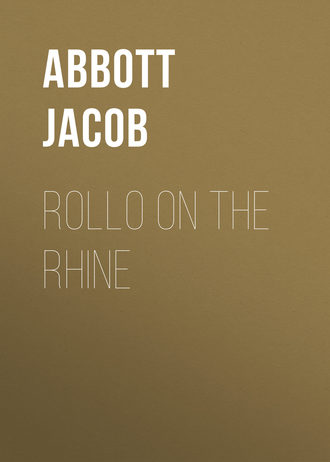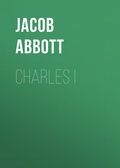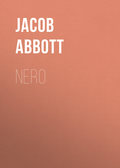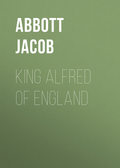
Abbott Jacob
Rollo on the Rhine
"Let us go down and see them," said Rollo.
What Mr. George said was true; and these things are but a specimen of the strange and curious legends and tales that are told to the traveller, and of the extraordinary relics and wonders that are exhibited to his view, in the old churches and monasteries, which are almost as numerous as the castles, on the Rhine. The carriage, after ascending a long time, stopped at a gate by the way side, whence a long, straight road led up to the church, which stood on the very summit of the hill. Mr. George and Rollo got out and walked up. When they drew near to the church, they turned round to admire the splendor of the landscape, and to see if the carriage was still waiting for them below. They saw that the carriage still stood there, and that there was another one there too, and that a party of ladies and gentlemen were descending from it to come up and see the church. There was a little girl in this party.
"I should not wonder if that was Minnie," said Rollo.
In a short time this party, with a commissioner at the head of them, came up the walk. The girl proved to be really Minnie. She seemed very glad to see Rollo, and she stopped to speak with him while the rest of the party went on.
Rollo and Minnie followed closely behind. The commissioner led the way round to the side of the church, where there were some other ancient buildings, which were formerly a nunnery. Here they found a man who had the care of the place. He was a sacristan.8 He brought a great key, and unlocked the church door, and let the party in.
The interior of the church was very quaint and queer,—as in truth the interiors of all the old churches are on the banks of the Rhine,—and was adorned with a great many curious old effigies and paintings. After waiting a few minutes for the company to look at these, the sacristan went to a place in the middle of the church before the altar, and lifted up a great trap door in the floor. When the door was lifted up, a flight of steps was seen leading down under ground.
"Where are they going now?" said Minnie.
"I suppose they are going down to see the monks," said Rollo.
The party went down the stairs, Rollo and Minnie following them. The sacristan had two candles in his hands. As soon as he got to the bottom of the stairs, he passed along a narrow passage way between two rows of open coffins, placed close together side by side, and in each coffin was a dead man, his flesh dried to a mummy, his clothes all in tatters, and his face, though shrivelled and dried up, still preserving enough of the human expression to make the spectacle perfectly horrid. When Rollo and Minnie reached the place near enough to see what was there, the sacristan was moving his candles about over the coffins, one in each hand, so as to show the bodies plainly. At the first glance which Minnie obtained of this shocking sight, she uttered a scream, and ran up the stairs again as fast as she could go.
Rollo followed her, but somewhat more slowly. When he came out into the church, he caught a glimpse of Minnie's dress, as she was just making her escape from the door. Rollo would have followed her, but he was afraid of losing his uncle George.
When the party, at length, came up from their visit to the dead monks, they went to see the sacred staircase. Rollo went with them. The staircase seemed to be at the main entrance to the church: the party had gone round to a door in the side where they came in.
The sacred stairs occupied the centre of the hall in which they were placed. There were on the sides two plain and common flights of stairs, for people to go up and down in the usual way. The sacred stairs in the centre could only be ascended and descended on the knees.
The side stairs were separated from the central flight by a solid balustrade or wall, not very high, so that people who came to see the sacred steps could stand on the side steps and look over. The flight of sacred steps was very wide, and was built of a richly variegated marble, of brown, red, and yellow colors, intermingled together in the stone; and some of the stains were said to have been produced by the blood of Christ. Here and there, too, on the different steps of the staircase, were to be seen little brass plates let into the stone, beneath which were small caskets containing sacred relics of various kinds, such as small pieces of wood of the true cross, and fragments of the bones of saints and apostles. Neither Mr. George nor Rollo took much interest in this exhibition; and so, giving the sacristan a small piece of money, they went back to their carriage. As Rollo got into the carriage that he had come in, he saw that Minnie was seated in hers, and she nodded her head when Rollo's carriage moved away, to bid him good by.
Mr. George and Rollo passed one or two other very picturesque and venerable looking ruins on the way up the river, but they did not stop to go and explore any of them. In one place, too, they rode along a sort of terrace, where the view over the river, and over the fields and vineyards beyond, was perfectly enchanting. Mr. George said he had never before seen so beautiful a view. It was at a place where the road had been walled up high along the side of a hill, at some distance from the river, so that the view from the carriage, as it moved rapidly along, extended over the whole valley. The fields and vineyards, the groves and orchards, the broad river, the zigzag paths leading up the mountain sides, the steamers and canal boats gliding up and down over the surface of the water, and the mountains beyond, with the rocky summit of Drachenfels, crowned with its castle, towering among them, combined to make the whole picture appear like a scene of enchantment.
The poet Byron described this view in three stanzas, which have been read and admired wherever the English language is spoken, and have made the name of Drachenfels more familiar to English and American ears than the name of almost any other castle on the Rhine.
Drachenfels
The castled crag of Drachenfels
Frowns o'er the wide and winding Rhine,
Whose breast of waters broadly swells
Between the banks which bear the vine;
And hills all rich with blossomed trees,
And fields which promise corn and wine,
And scattered cities crowning these,
Whose far white walls along them shine,
Have strewed a scene which I should see
With double joy wert thou with me.
And peasant girls with deep blue eyes,
And hands which offer early flowers,
Walk smiling o'er this paradise;
Above, the frequent feudal towers
Through green fields lift their walls of gray;
And many a rock which steeply lowers,
And noble arch in proud decay,
Look o'er this vale of vintage bowers;
But one thing want these banks of Rhine—
Thy gentle hand to clasp in mine!
The river nobly foams and flows,
The charm of this enchanted ground,
And all its thousand turns disclose
Some fresher beauty varying round:
The haughtiest breast its wish might bound
Through life to dwell delighted here;
Nor could on earth a spot be found
To nature and to me so dear,
Could thy dear eyes in following mine
Still sweeten more these banks of Rhine.
In due time, Mr. George and Rollo arrived at Rolandseck, where they were received very politely by the landlord of the inn, and introduced to a very pleasant room, the windows of which commanded a fine view both of Drachenfels and of the river.

Chapter VI.
Roland's Tower
"And now," said Mr. George, as soon as the porter had put down his trunk and gone out of the room, "the first thing to be thought of is dinner."
Rollo was also ready for a dinner, especially for such excellent little dinners of beefsteaks, fried potatoes, nice bread and butter, and coffee, as his uncle usually ordered. So, after refreshing themselves a few minutes in their room, Mr. George and Rollo went down stairs in order to go into the dining room to call for a dinner. As they passed through the hall, they saw a door there which opened out upon beautifully ornamented grounds behind the house. The land ascended very suddenly, it is true, but there were broad gravel paths of easy grade to go up by; and there were groves, and copses of shrubbery, and blooming flowers, in great abundance, on every hand. On looking up, too, Rollo saw several seats, at different elevations, where he supposed there must be good views.
While they were standing at this door, looking out upon the grounds, a waiter came by, and they told him what they wished to have for dinner.
"Very well," said the waiter; "and where will you have it? You can have it in your room, or in the dining room, or in the garden, just as you please."
"Let us have it in the garden," said Rollo.
"Well," said Mr. George, "in the garden."
So the young gentlemen went out into the garden to choose a table and a place, while the waiter went to make arrangements for their dinner.
The part of the garden where the seats and the tables were placed was a level terrace, not behind the house, but in a line with it, at the end, so that it fronted the road, and commanded a very fine view both of the road and of the river, as well as of all the people, and carriages, and boats that were passing up and down. This terrace was high up above the road, being walled up on that side, as I have already described; and there was a parapet in front, to prevent people from falling down. This parapet was, however, not so high but that Rollo could look over it very conveniently, and see all that was passing in the road and on the river below. There was a sort of roof, like an awning, over this place, to shelter it from the sun and the rain; and there were trees and trellises behind, and at the ends, to enclose it, and give it an air of seclusion. The trellises were covered with grapevines, on which many clusters of grapes were seen, that had already grown quite large. Numerous flower pots, containing a great many brilliant flowers all in bloom, were placed in various positions, to enliven and adorn the scene. Some were on the tables, some on benches behind them, and there were six of the finest of them placed at regular intervals upon the parapet, on the side towards the street. These last gave the gardens a very attractive appearance as seen outside, by people going by in carriages along the road, or in boats on the river.
Rollo and Mr. George chose a table that stood near the parapet, in the middle of the space between two of the flower pots, and sitting down they amused themselves by looking over the wall until the waiter brought them their dinner.9 The dinner came at length, and the travellers immediately, with excellent appetites, commenced eating it.
"Uncle George," said Rollo, in the middle of the dinner, "my feet are getting pretty lame."
"Are they?" said Mr. George.
"Yes," said Rollo, "I have walked a great deal lately."
"Then," said Mr. George, "you must let them rest. You must go down to the river and bathe them in the cool water after dinner, and not walk any more to-night."
"But I want to go up to Roland's Tower," said Rollo.
"Well," said Mr. George, "perhaps you might do that. You can ride up on one of the donkeys."
This plan was accordingly agreed to, and as soon as the dinner was ended it was put in execution.
The donkeys that were used for the ascent of the hill to Roland's Tower were kept standing, all caparisoned, at the foot of the hill, at the entrance to a little lane where the pathway commenced. Mr. George and Rollo had seen them standing there when they came along the road. The place was very near where they were sitting; so that, after finishing their dinner, they had only to walk a few steps through the garden, and thence out through a back gate, when they found themselves in the lane, and the donkeys and the donkey boys all before them.
Mr. George thought that he should prefer to walk up the mountain; but Rollo chose a donkey, and with a little assistance from Mr. George he mounted into the seat. At first he was afraid that he might fall; for the seat, though there was a sort of back to it, as has already been described, to keep persons in, seemed rather unsteady, especially when the donkey began to move.
"It will not do much harm if I do fall," said Rollo, "for the donkey is not much bigger than a calf."
Mr. George, who was accustomed to leave Rollo a great deal to himself on all occasions, did not stop in this instance to see him set off, but as soon as he had got him installed in his seat, began to walk himself up the pathway, with long strides, and was soon hid from view among the grapevines, at a turn of the road, leaving Rollo to his own resources with the donkey and the donkey boy. At first the donkey would not go; but the boy soon compelled him to set out, by whipping him with the stick, and away they then went, all three together, scrambling up the steep path with a rapidity that made it quite difficult for Rollo to keep his seat.
The paths leading up these hill sides on the banks of the Rhine are entirely different from any mountain paths, or any country roads, of any sort, to be seen in America. In the first place, there is no waste land at the margin of them. Just width enough is allowed for two donkeys or mules to pass each other, and then the walls which keep up the vineyard terrace on the upper side, and enclose the vine plantings on the other, come close to the margin of it, on both sides, leaving not a foot to spare. The path is made and finished in the most perfect manner. It is gravelled hard, so that the rains may not wash it; and it mounts by regular zigzags, with seats or resting-places at the turnings, where the traveller can stop and enjoy the view. In fact, the paths are as complete and perfect as in the nature of the case it is possible for them to be made; and well they may be so, for it is perhaps fifteen hundred years since they were laid out; and during this long interval, fifty generations of vinedressers have worked upon them to improve them and to keep them in order. In fact, it is probable that the roads and the mountain paths, both in Switzerland and on the Rhine, are more ancient than any thing else we see there, except the brooks and cascades, or the hills and mountains themselves.
When Rollo had got up about two thirds the height of the hill, he came to the pavilion, which you see in the engraving standing on a projecting pinnacle of the rock, a little below the ruin. There was a gateway which led to the pavilion, by a sort of private path; but the gate was set open, that people might go in. Rollo dismounted from his donkey, and went in. His uncle was already there.
It is wholly impossible to describe the view which presented itself from this commanding point, both up and down the river, or to give any idea of the impression produced upon the minds of our travellers when they stood leaning over the balcony, and gazed down to the water below from the dizzy height. The pavilion is built of stone, and is secured in the most solid and substantial manner, being very far more perfect in its construction than the old towers and castles were, whose remains have stood upon these mountains so long. It will probably last, therefore, longer than they have, and perhaps to the very end of time.
It stands on a pinnacle of basaltic rock, which here projects so as actually to overhang its foundations.
The view both up and down the river is inconceivably beautiful and grand.
There was no seat in the pavilion, but there was one against the rocks, and under the shades of the trees just behind it; and here Mr. George and Rollo sat down to rest a while, after they had looked out from the pavilion itself as long as they desired.
"I believe I'll walk up the rest of the way," said Rollo, "and let the donkey stay where he is."
"Why, don't you like riding on the donkey?" asked Mr. George.
"Yes," said Rollo, "I like to ride, but he don't seem to like to carry me very well. Besides, it is not far now to the top."
The path immediately above the pavilion passed out of the region of the vineyards, and entered a little thicket of evergreen trees, through which it ascended by short zigzags, very steep, until at length it came out upon a smooth, grassy mound, which crowned the summit of the elevation; and here suddenly the ruin came into view. It was a single ruined arch, standing alone on the brink of the hill. The arch was evidently, when first built, of the plainest and rudest construction. The stones were of basalt, which is a volcanic rock, very permanent and durable in character, and as hard almost as iron. The mortar between the stones had crumbled away a good deal, but the stones themselves seemed unchanged. Mr. George struck his cane against them, and they returned a ringing sound, as if they had been made of metal.
Around this arch were the remains of the ancient wall of the building, by means of which it was easy to see that the whole edifice must have been of very small dimensions, and that it must have been originally constructed in a very rude manner. The arch seems to have been intended for a door or a window. Probably they took more pains with the construction of the arch than they did with the rest of the edifice, using larger and better stones for it, and stronger mortar; and this may be the reason why this part has stood so long, while the rest has fallen down and gone to decay. In fact, it is generally found that the arches of ancient edifices are the parts of the masonry which are the last to fall.
The opening in the arch looked down the river. Mr. George took his stand upon the line of the wall opposite the Island of Nonnenwerth, and said that he supposed there must have been another window there.
"Here is where the old knight must have stood," said he, "to look down on the island, and the convent where his lost lady was imprisoned."
"Yes," said Rollo, "he could look right down upon it from here. I wonder whether the nun knew that he was up here."
"Yes," said Mr. George, "there is not the least doubt that she did. They found out some way to have an understanding together, you may depend."
After lingering about the old ruin as long as they wished, our travellers came down the hill again as they went up, except that Rollo walked all the way. He was afraid to ride on the donkey going down, for fear that he should fall.
Rollo went down to the river side, and taking off his stockings and shoes, bathed his feet in the stream. While he was there a great boat came by, towed by two horses that walked along the bank. The rope, however, by which the horses drew the boat was fastened, not to the side of the boat, as is common with us on canals, but to the top of the mast, so that it was carried high in the air, and it passed over Rollo's head without disturbing him at all. They always have the tow ropes fastened to the top of the mast on the Rhine, because the banks are in some places so high that a rope lying low would not draw.
Rollo remained on the bank of the river some time, and then he put on his shoes and stockings and went up into his room. He found that his uncle George was seated at the table, with pen, ink, and paper out, and was busy writing letters.
"Uncle George," said Rollo, "what shall I do now?"
"Let me think," said Mr. George. Then after a moment's reflection, he added, "I should like to have you take a sheet of paper, and draw this little table up to the window, and take your seat there, and look out, and whenever you see any thing remarkable, write down what it is on the paper."
"What shall you do with it when I have got it done?" said Rollo.
"I'll tell you that when it is done," replied Mr. George.
"But perhaps I shall not see any thing remarkable," said Rollo.
"Then," said Mr. George, "you will not have any thing to write. You will in that case only sit and look out of the window."
"Very well," said Rollo, "I will do it. But will it do just as well for me to go down to the terrace, and do it there?"
"Yes," said Mr. George, "just as well."
So Rollo took out his portfolio and his pocket pen and inkstand, and went down to the terrace, and there he sat for nearly two hours watching what was going by, and making out his catalogue of the remarkable things. At the end of about two hours, Mr. George, having finished his letters came down to see how Rollo was getting along. Rollo showed him his list, and Mr. George was quite pleased with it. In the course of the evening Rollo made several additions to it; and when at length it was completed, it read as follows.








